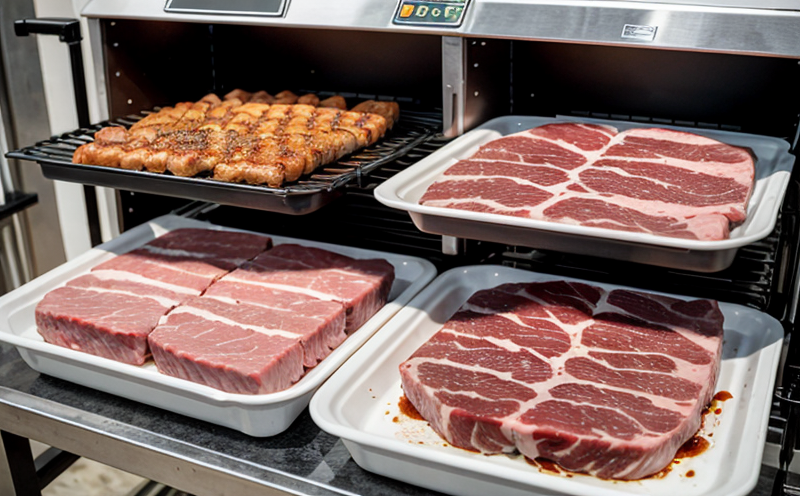ISO 21415 Pesticide Residue Testing in Meat Products
The ISO 21415 standard provides a comprehensive framework for the analysis of pesticide residues in food products, ensuring that meats and poultry are safe from harmful contaminants. This service plays a critical role in safeguarding public health by identifying potential risks associated with pesticide exposure during agricultural practices.
Meat and poultry form an essential part of the global diet, contributing to nutrition and economic stability across various sectors including healthcare, agriculture, and food production. Ensuring that these products are free from harmful residues is paramount for maintaining consumer trust and regulatory compliance. By adhering to ISO 21415 guidelines, laboratories like Eurolab ensure reliable and accurate results, supporting the integrity of supply chains.
The testing process involves a series of steps aimed at achieving precision in detecting minute traces of pesticides within meat products. Initially, samples are prepared meticulously following strict protocols designed to preserve their integrity and authenticity. Subsequently, advanced analytical techniques such as liquid chromatography coupled with tandem mass spectrometry (LC-MS/MS) are employed to quantify pesticide residues.
It is important to note that this testing method targets a wide range of pesticides commonly used in agricultural settings, ensuring comprehensive coverage. Compliance with ISO 21415 not only upholds the quality and safety standards set forth by international bodies but also aligns with national regulations specific to food safety and health.
For instance, countries like China have stringent laws governing pesticide use on crops intended for livestock feed. Similarly, in Europe, directives such as Regulation (EU) No 396/2005 outline permissible levels of pesticides allowed in animal feedstuffs. Adherence to these regulations is crucial not only from an ethical standpoint but also for protecting the environment against overuse.
The significance of this service extends beyond mere compliance; it fosters trust among consumers who increasingly demand transparency regarding product origins and processing methods. Furthermore, by identifying any anomalies early on through rigorous testing processes, potential issues can be addressed promptly before they escalate into larger problems affecting public health or industry reputation.
- Sample preparation is critical to ensuring accurate results.
- Analytical techniques must be highly sensitive to detect trace amounts of pesticides.
- Compliance with ISO 21415 ensures consistent quality across different batches.
In conclusion, the implementation and adherence to ISO 21415 standards in pesticide residue testing for meat products are vital components in maintaining both consumer confidence and regulatory compliance. By leveraging advanced analytical techniques and strict procedural guidelines, laboratories such as Eurolab contribute significantly towards creating safer food environments.
Why It Matters
The importance of ISO 21415 lies in its role in safeguarding public health by ensuring that meats and poultry are free from harmful pesticide residues. This standard is crucial for several reasons:
- Consumer Safety: Ensures that the food consumed daily does not contain hazardous levels of pesticides.
- Regulatory Compliance: Helps businesses meet international standards set by regulatory bodies like the European Union and United States Department of Agriculture (USDA).
- Ethical Responsibility: Supports sustainable agricultural practices, promoting responsible use of chemicals in farming activities.
- Environmental Protection: Reduces risks associated with excessive pesticide usage on crops intended for animal feed.
In essence, ISO 21415 fosters trust among consumers and strengthens the credibility of food producers by offering a robust system for detecting and mitigating potential health hazards linked to pesticide residues in meat products.
Eurolab Advantages
At Eurolab, we pride ourselves on delivering top-tier services that meet or exceed industry standards. Our proficiency in ISO 21415 pesticide residue testing for meat products is underpinned by several key advantages:
- Expertise and Experience: With years of experience in food safety analysis, Eurolab’s team comprises highly skilled professionals who stay updated with the latest techniques and technologies.
- Advanced Equipment: Utilizing state-of-the-art instruments like LC-MS/MS ensures precise detection even at extremely low concentrations.
- Comprehensive Reporting: Providing detailed reports that include comprehensive data analysis, interpretation, and recommendations for improvement where necessary.
- Client-Centric Approach: Tailoring our services to meet the unique needs of each client, whether it be a small-scale producer or large multinational corporation.
Our commitment to excellence in ISO 21415 compliance sets us apart from other providers, ensuring that every test conducted is reliable and accurate. Trust Eurolab for your pesticide residue testing requirements knowing you are receiving the highest quality service possible.
Quality and Reliability Assurance
Ensuring the accuracy and reliability of our results is paramount to Eurolab’s mission. We employ rigorous quality control measures throughout every stage of the ISO 21415 pesticide residue testing process:
- Sample Collection: Rigorous protocols are followed to ensure that samples are representative of larger batches, reducing variability in results.
- Sample Preparation: Careful handling and preparation prevent contamination or degradation of the sample, maintaining its integrity during analysis.
- Analytical Techniques: Our laboratories use cutting-edge technologies including LC-MS/MS to achieve high sensitivity levels necessary for detecting trace amounts of pesticides.
- Data Analysis: Utilizing sophisticated software programs helps in interpreting complex datasets accurately and consistently.
In addition, we maintain strict adherence to ISO standards, which guarantees consistency across all tests performed. This approach not only enhances confidence in our findings but also supports continuous improvement efforts within the laboratory environment.
Furthermore, periodic internal audits and external certifications reinforce these quality assurance practices, ensuring that Eurolab remains at the forefront of food safety testing worldwide.





